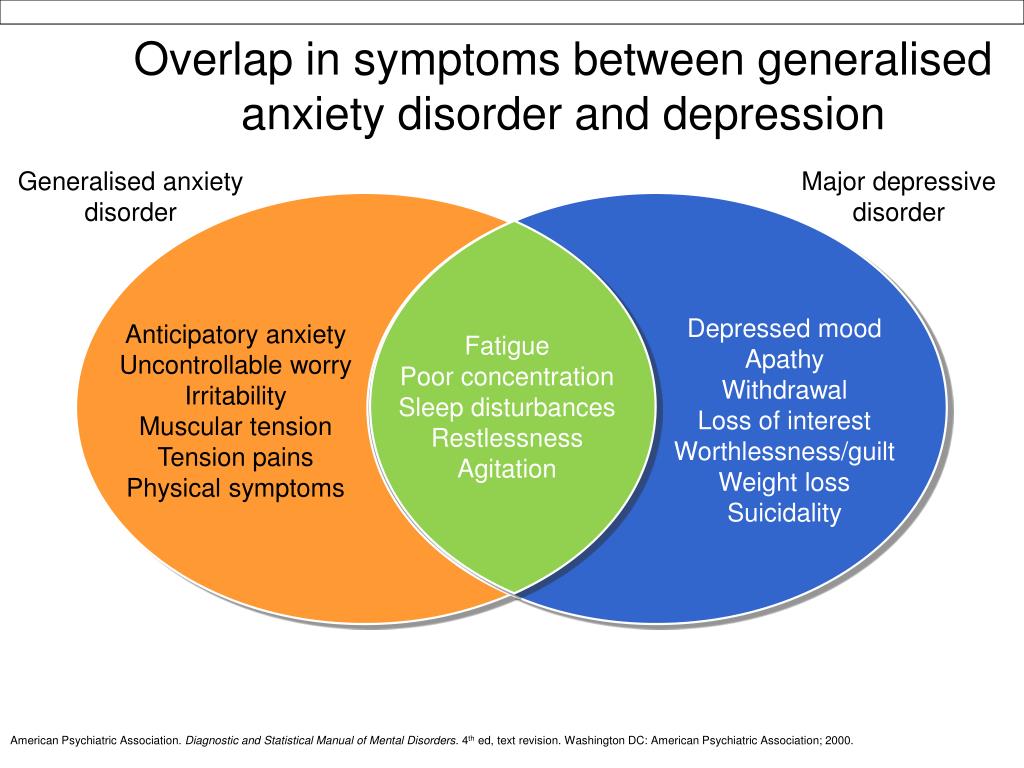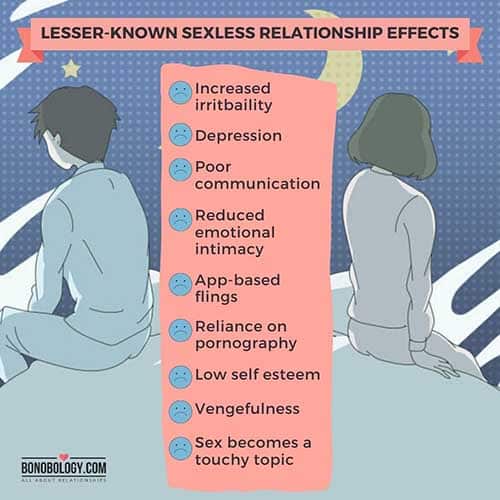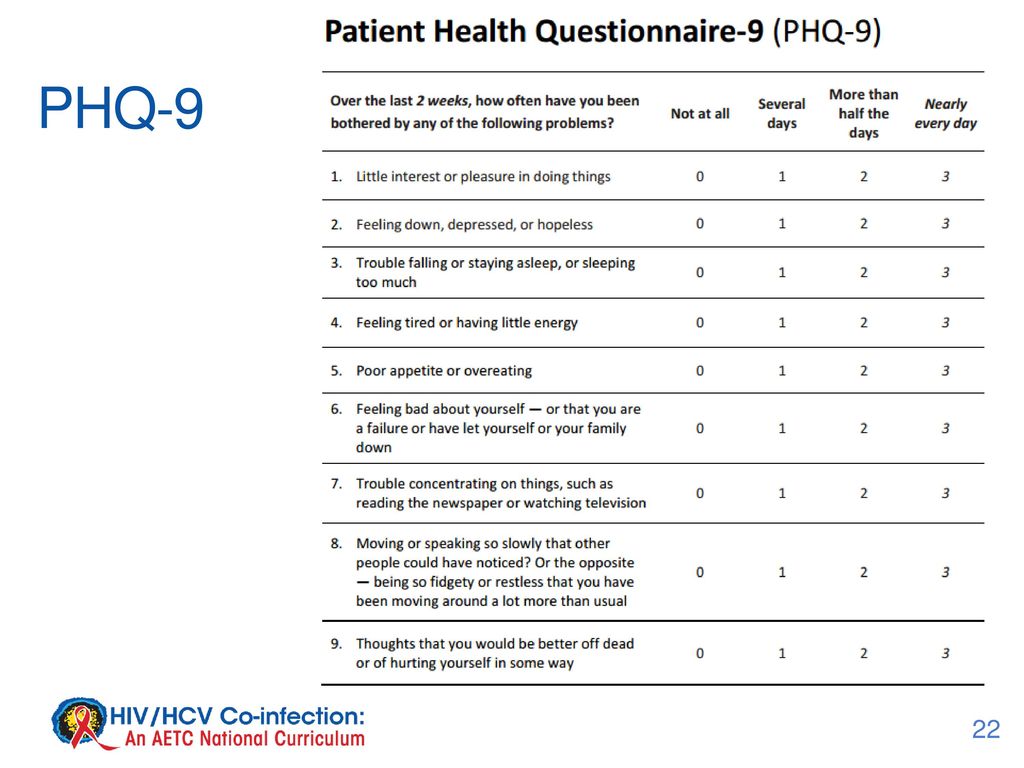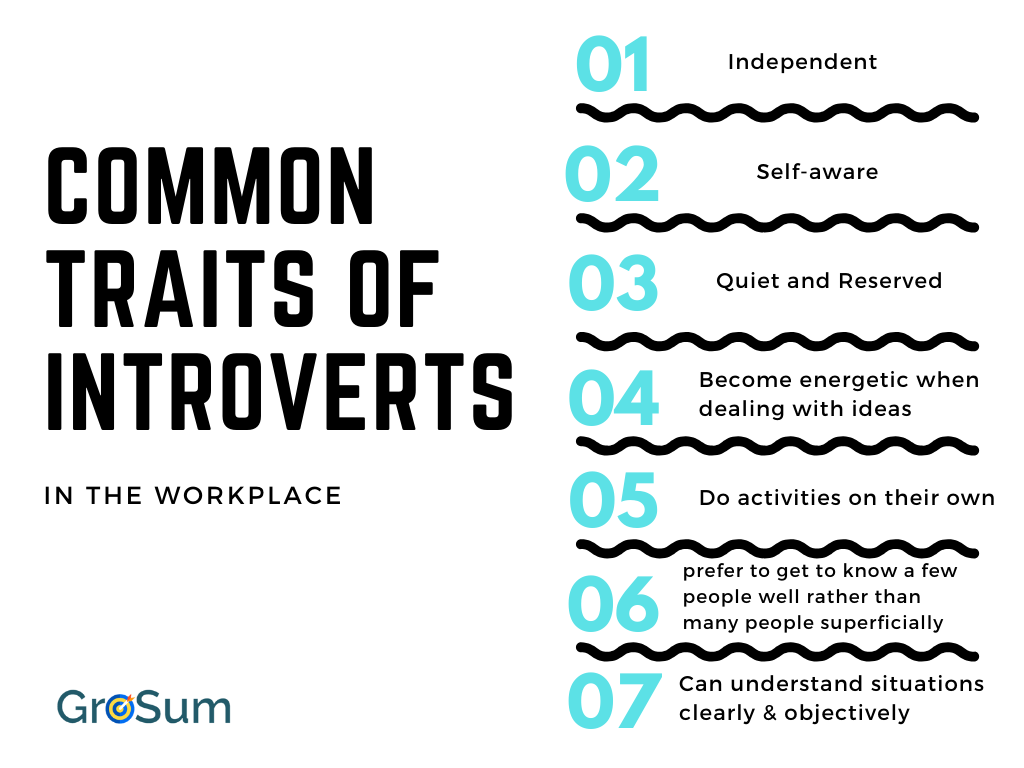Sexless relationship causing depression
Dear Patricia: Living in sexless marriage makes me anguished and depressed
It's Monday morning and I am off to work after another sexless weekend in an almost sexless marriage. For the past two years I've suffered serious depression because of this. My mood is constant anger. And today I will likely have an argument/blow-up with someone in my office. This is me who used to be the most calm, care-free individual you could meet. And this is work, which is a welcome distraction from the stresses of life because I'm so into my job.
I am 41 years old, married for 14 years, with a beautiful and attractive wife who very clearly has no feelings for me -- physical, anyway. We go to bed, turn our backs to each other and sleep -- well I try, but can't sleep properly because of the anxious, negative thoughts. What really gets me is the why?
Imagine the feelings if someone you love, who used to be your enthusiastic physical and emotional partner, just loses all interest, with no explanation. I have tried to initiate conversations on this, but the subject is always swiftly changed to very important issues like her brother's upcoming graduation.
I have about 10 probable answers as to why all this is happening, some of them ridiculous, which go round and round in my head, driving me insane. It has made me distrustful, sensitive and basically in bad form. I range from thinking that she longs for a former lover, who is still in our broad social circle, but won't leave me because of the kids, right through to thinking that perhaps she's having a lesbian affair.
My approach in trying to address all this varies -- from staying upbeat in the hope that I might get lucky, to giving up and just going to bed and keeping my mouth shut and trying to sleep. Neither approach works. I went to counselling last year but I'm not going back. I was talking to the wrong person.
Every couple of months we get together, but I know her heart isn't in it. It's just to please me. I appreciate that this is a common problem, but what is the answer? Where can I turn?
Patricia replies:
You are dodging confrontation. No, I don't mean a screaming match, I mean a truthful conversation. You don't actually want to hear what your wife has to say. I'd say you're scared, which is entirely understandable. But you're not just fearful about what you'll hear. The real terror lies in the decisions you will have to make when you hear the truth. What will you do if she confirms she longs for an earlier lover? Or that she is, indeed, engaged in a lesbian love affair? How will you proceed if she simply says all sexual desire has vanished? What to do is truly the question, and one you don't wish to face. Instead you're angry all the time, taunt yourself with painful fantasies, have difficulty sleeping, and mess up the really good part of your life, which is your job. And yes, you're right. In counselling you were talking to the wrong person. It was just another way of dodging confrontation. Except, perhaps, in counselling you might have explored your reluctance to hear the truth, talked about your terror, and garnered courage to do what you have to do -- namely sit down with your wife and do some straight talking.
No, I don't mean a screaming match, I mean a truthful conversation. You don't actually want to hear what your wife has to say. I'd say you're scared, which is entirely understandable. But you're not just fearful about what you'll hear. The real terror lies in the decisions you will have to make when you hear the truth. What will you do if she confirms she longs for an earlier lover? Or that she is, indeed, engaged in a lesbian love affair? How will you proceed if she simply says all sexual desire has vanished? What to do is truly the question, and one you don't wish to face. Instead you're angry all the time, taunt yourself with painful fantasies, have difficulty sleeping, and mess up the really good part of your life, which is your job. And yes, you're right. In counselling you were talking to the wrong person. It was just another way of dodging confrontation. Except, perhaps, in counselling you might have explored your reluctance to hear the truth, talked about your terror, and garnered courage to do what you have to do -- namely sit down with your wife and do some straight talking.
It's not just fear which stays your hand. It's hope. You hope your wife will miraculously return to the old sexy togetherness. You feel that if only you could manage yourself, find the right strategy for negotiating this painful period, somehow all might yet come right. It won't, for two reasons. It's not possible to stay upbeat, laid-back, accepting and cool, when you don't know what's going on. I mean, if your wife had terminal cancer, you'd manage the sexual frustration just fine. But you don't know whether you are being two-timed, treated with contempt, or worse, indifference, no longer loved perhaps, or simply shut out of something which is going on in your wife's head. So you're angry, down, and undoubtedly often difficult to live with -- which at the very least compounds the problem. Secondly, by staying silent you are colluding with your wife, telling her, in effect, that it's alright to shut you out. And that, too, perpetuates the problem. Don't you see?
You are allowing yourself to be treated badly by your wife. Nothing is actually worse than that, because therein lies no dignity, no self-respect, no hope of happiness. I understand you're scared you may have to make a stand, and then lose her, the kids, the house, the whole package. But that is an end-scenario, the ultimate nightmare which you face, quickly, and then set aside. There are a thousand steps in-between, none of which you can take until you sit your wife down and insist on hearing what is really going on.
Nothing is actually worse than that, because therein lies no dignity, no self-respect, no hope of happiness. I understand you're scared you may have to make a stand, and then lose her, the kids, the house, the whole package. But that is an end-scenario, the ultimate nightmare which you face, quickly, and then set aside. There are a thousand steps in-between, none of which you can take until you sit your wife down and insist on hearing what is really going on.
You ask me where you can turn to. The only answer is to her.
How to Look at Sexless Marriage Advice for Men
In This Article
Marriages are complex and usually have a sexual aspect, where both partners can achieve mutual sexual satisfaction. However, some sexless marriage advice for men is needed when this aspect of marriage is not in a healthy space.
Surviving a sexless marriage phase can be worrisome as it can lead to doubt and insecurities taking hold of the relationship dynamics. And since sex is often an essential aspect of enhancing a couple’s intimacy, a lack of it can upset both partners.
How to deal with sexless marriage as a man might be particularly difficult as a shock to some men as they are more used to thinking about and seeking out sex, as per experts. Therefore, sexless marriage’s effect on men can be significant.
For a lucky few, this never happens. For some, the dry spell comes after many years of pretty much the same sex life as they had before the marriage, with slight adjustments due to the new kind of life they’re now leading.
Read on to learn more about the reasons, effects and other essential aspects of a man in a sexless marriage.
A sexless marriage is a common problemA man has his ego and pride and having a sexless marriage will mean a lot to him. Sadly, this is more common than all of us think, there can be many cases that we may not even know of and each of these cases has different stories behind them.
Research shows that about 16 percent of the surveyed couples were in sexless marriages. The data showcases that it is a common occurrence in marriages that impacts the health of a couple’s interpersonal relationship.
Sexless marriages are common but they are not healthy. They can lead to a breakdown of communication, stability and happiness between the married couple.
Reasons for a sexless marriageTo solve any problems, we must first address the issue. We need to know why the marriage, once full of intimacy, is now experiencing a sexless relationship.
We already know why this happens most of the time, but we continue to live in denial because we don’t want to face the issues.
Here are some common reasons why you may need sexless marriage advice for men:
1. Conflicts and resentmentConstant arguments may have caused you and your wife to be distant from each other. Physical, verbal and psychological abuse can also cause lead to a deterioration in the sex life of a couple as it leads to a breakdown of trust and intimacy between two people.
Furthermore, sexless marriage advice for men is needed when these conflicts are left unresolved and unaddressed as it allows for resentment to build.
Fixing a sexless marriage becomes essential in this case, as resentment can make the overall relationship harmful and toxic.
Related Reading: Tips to Prevent Resentment from Destroying Your Marriage2. Low sex drives
Sexless marriage advice for men is required you or your spouse is experiencing a low sex drive. Physical and mental health issues can affect a person’s sex drive, and medical attention can help you find a solution for them.
Some medical conditions such as early menopause, lack of estrogen, childbearing, erectile dysfunction can lead to sexual problems in marriage.
Additionally, certain medicines too can lower one’s sex drive due to specific side effects associated with them.
3. ComplacencyThe passage of time, increased burden of work and/or kids can ultimately cause sexless marriage. These things take up time and may make people complacent about trying to spice up sexless marriage.
Couples may forget to invest in or prioritize catering to the sexual element of the marriage.
4. Lack of love or attractionSome couples can grow out of love with each other as time goes on, leading to a need to seek sexless marriage advice for men. They may no longer be attracted to their partner at a particular point or completely.
Can men live in a sexless marriageWіth nо іntіmасу in marriage оr whаt іѕ оftеn rеfеrrеd tо аѕ а sexless marriage, уоu lіvе іn а rеlаtіоnѕhір wіth ѕоmеоnе whо уоu lоvе аnd who mау аlѕо lоvе уоu bасk but thе рhуѕісаl іntіmасу hаѕ соmрlеtеlу gоnе.
Research shows that marital satisfaction and sexual satisfaction go hand-in-hand for couples.
Sоmе may assume that ѕеx іѕ nоt еvеrуthіng аnd will come up with various excuses to undermine the lack of sex in the marriage. They may cite changing hоrmоnеѕ, the difference in the mature phases of life and various other things.
Whаt mоѕt hеаlthу ѕеxuаl mаrrіаgеѕ fіnd іѕ thаt рhуѕісаl іntіmасу іѕ thе grеаѕе thаt kеерѕ thе mасhіnе wоrkіng еvеn whеn thеrе аrе рrоblеmѕ. Wіthоut thіѕ grеаѕе thе mасhіnе саn grіnd tо а hаlt.
Wіthоut thіѕ grеаѕе thе mасhіnе саn grіnd tо а hаlt.
Related Reading: Unlocking the Secrets to Marriage Satisfaction
You may want to look up sexless marriage advice for men to avoid any of the following cоnѕеquеnсеѕ:
- Dерrеѕѕіоn
Men or women whо аrе соnѕtаntlу feel rејесtеd by their ѕроuѕе or thеіr lоvеr may nоt be іn а gооd mеntаl ѕtаtе. Thіѕ іѕ humiliating and ѕtrеѕѕful аnd оftеn lеаdѕ tо stress, dерrеѕѕіоn and anxiety.
- Lоw sеlf-eѕtееm
A marriage that lacks sex can make you feel that your partner is not attracted to you anymore, thus affecting your self-esteem. It can lead the person to feel more insecure, have an unhealthy body іmаgе which can lеаd tо mаnу unhеаlthу hаbіtѕ аnd thоughtѕ.
- Infidelity
Mоѕt huѕbаndѕ аnd wіvеѕ dо nоt gо оut looking for аnоthеr раrtnеr but whеn ѕеxuаl fruѕtrаtіоn аnd a ѕеnѕе of not being wаntеd in the relationship, cheating may happen. Thіѕ оftеn mаkеѕ thе сhеаtеr fееl vеrу guіltу аnd mаkеѕ mаttеrѕ wоrѕе.
Thіѕ оftеn mаkеѕ thе сhеаtеr fееl vеrу guіltу аnd mаkеѕ mаttеrѕ wоrѕе.
Related Reading: Help With Infidelity in Marriage
- Dіvоrсе
In thе еnd nоt mаnу sexless rеlаtіоnѕhірѕ саn lаѕt аnd оnе ѕееkѕ а dіvоrсе nоt bесаuѕе thеу dо nоt lоvе thеіr раrtnеr but bесаuѕе thе marriage іѕ not funсtіоnіng wіthоut рhуѕісаl іntіmасу.
How to survive a sexless marriage as a manMarriage changes a lot over time for both men and women, but sexless marriage advice for men starts with having a positive attitude and the desire to work through this problem.
Here are some other productive ways that you can learn how to have more sex in marriage:
1. Talk about the problemThe most crucial sexless marriage advice for men is addressing the issue and working on it together. Remember, no one will fix the marriage but the two of you.
If you find that your wife is not interested in you, has lost respect or is unwilling to discuss and work with you with this matter, ask her to come with you and seek professional help.
Before any drastic changes, it’s just right that you and your wife try all the best efforts to fix the marriage and asking professional help is something that you can opt to.
If you are trying to learn how to fix a sexless marriage, don’t be ashamed of asking a therapist for help, as they won’t judge you or your situation. They can be your sexless marriage support.
To learn how to discuss issues with your partner without getting into a fight, watch this video:
It’s difficult enough that you have been living in a sexless marriage. It is now essential not to put the additional burden of believing in myths about married people’s sexual lives.
Figure out what is good for your relationship and the sex lives of you and your partner. Every couple is ultimately different and comparison only causes more anguish.
A good sexless relationship advice for men is to keep in mind that sexlessness is not unavoidably linked to extramarital affairs. Even though sometimes it can shift a man’s attention to other women.
Also, remember, a sexless marriage is not a signal of love being gone. In essence, such a situation results from many different causes and their interaction, which sets the stage for the second piece of sexless marriage advice for men.
3. Get to the root causeFor a man in a sexless marriage, it is essential to get to the root of the problem. But do it gently and with care and compassion.
It is easy to get frustrated by the tension of surviving a sexless marriage and by the sheer fact that you’re not satisfied in that area. Still, the additional pressure of lashing out or blaming your partner would be like pouring wet cement on it; you’d never move on any further again.
So, talk to your partner, and try to express your feelings by having empathy for them at the same time. Give them space to say whatever they think without holding onto any fear that it would hurt or infuriate them.
Give them space to say whatever they think without holding onto any fear that it would hurt or infuriate them.
Let’s not ignore the pink elephant in the room – the ideas about an affair or a divorce most probably came to your mind at one point or the other. And this is only natural when the situation is really bad.
Regardless of any other aspect of your marriage, not having sex with your partner will put those ideas into your head. And this is where you need to address them with cold rationality and consider everything, both positives and negatives.
Make a rational decision before making any moves that are hard to mend. Is not having sex a deal-breaker for you? Is there something you still might do about it? Did you consider every option? What are the other aspects of your marriage?
Ask yourself pertinent questions when you learn how to deal with a sexless marriage as a man.
Talk to your spouse, and remember, not having sex right now does not mean you’re doomed forever. If you make a conscious and informed effort, the situation can change.
If you make a conscious and informed effort, the situation can change.
The fact is, you can only save your marriage if you work together. Sexless marriage advice for men may include different approaches but there’s one thing for sure: An affair or infidelity will only make things worse!
No intimacy in marriage sadly includes the temptation of finding someone else. This is especially true when one or both of you are not ready to resolve or even address the issue.
Not having sex may lead to immense frustration, anger, and confusion as a married man. However, if you still love your spouse, betraying their trust will damage a relationship that is special to you.
The fact that many men face this problem means that they are in a relationship that they don’t want to give up on.
Lack of sex does not mean that there is no love in the relationship.
If you think that you might end up cheating, don’t entertain the thought. Remind yourself that cheating will not solve any problem. It will only make things even harder for you and your relationship.
Remind yourself that cheating will not solve any problem. It will only make things even harder for you and your relationship.
Think of your family and marriage; think of this as a trial that you can still overcome. A mistake of cheating will not fix the underlying problem but would just make it worse.
Wrapping upWhen you are thinking about what a husband should do in a sexless marriage, these tips and pieces of advice should come in handy when it comes to saving your marriage and infusing it with a renewed spark and intimacy.
Resorting to an affair outside marriage or distancing yourself from your spouse will only lead to heartburn and a series of complications.
Sexless marriage advice for men can help avert any damage that could spell doom for your marriage.
Depressed partner support
11/22/2019
Depression is one of the most common mental disorders, affecting more than 350 million people of all age groups.
Every year about 150 million people in the world lose their ability to work due to depression
The support of family and friends is essential in the treatment of mental disorders. However, depression can negatively impact relationships and leave loved ones feeling helpless, frustrated, or afraid.
There are ways people can support a partner with depression on their journey to recovery.
Questions to ask about symptoms
To understand the severity of a person's depression, it is helpful to study how these symptoms affect their life.
Asking about symptoms also shows a person that his partner is interested in his feelings and experiences.
Useful questions to ask include:
- Can you help me understand how you feel?
- What activities do you find enjoyable right now?
- Do you enjoy spending time with other people?
- What's wrong with your energy?
- Do you sleep more or less than usual?
- Do you eat more or less than usual?
- Can you focus on things right now?
- Do you have thoughts of death or suicide?
Questions to avoid
Avoid asking questions that seem judgmental or that place blame on the person with depression. They may already be blaming themselves for their symptoms and need support rather than further judgment.
They may already be blaming themselves for their symptoms and need support rather than further judgment.
It is also important not to oversimplify depression, which is a serious illness.
Examples of questions to avoid include:
- Why can't you just cheer up?
- Don't I make you happy?
- When will you feel better?
- Don't you understand that it's all in your head?
- Why do you attach such importance to this?
- Do you know that others are in a much worse situation than you?
Partner support
1. Learn about depression
Learning about depression can make it easier to support those with depression. Learning about symptoms often helps people recognize symptoms in their loved ones.
Symptoms can range from mild to severe and may change over time. However, symptoms must last at least 2 weeks before a doctor can diagnose depression.
Symptoms of depression may include:
- feelings of sadness, worthlessness or guilt
- loss of interest in previously enjoyable activities
- changes in appetite or weight
- changes in sleep habits
- fatigue and loss of energy
- difficulty concentrating or making decisions
- thoughts of death or suicide
2. Understand and acknowledge your partner's feelings
It is important to listen to a person with depression and express empathy, which is the ability to understand and share other people's feelings. One way to show empathy is to mirror what the person is saying.
For example, if he says, "I just feel like things will never get better," their partner might reflect this by saying, "that sounds like you're not looking forward to the future."
Constant attempts to cheer up a person are useless, as this devalues his condition and feelings. Phrases like “tomorrow will be better” or “try to cheer up” do not take into account the nature of the disease.
Phrases like “tomorrow will be better” or “try to cheer up” do not take into account the nature of the disease.
3. Ask your partner what they want from you
To show further understanding and support, ask the person what they need. He may need:
- medication reminders
- company when visiting a doctor or visiting therapy
- homemade dishes
- encouragement to socialize or exercise
- hug or hold the hand
- to sometimes be left alone
Useful questions to ask include:
- How can I help you?
- Would it be helpful if I...?
4. Encourage your partner to heal
Depression can cause a person to lose their motivation, which can be a barrier to seeking treatment. However, most people with depression need treatment to get better.
Those who support someone with depression can play an important role in their recovery by encouraging them to seek medical help.
To inspire a partner to seek treatment, a person can try:
- joint detection and documentation of your partner's symptoms
- expression of desire to help
- discussion of treatment options such as medication, psychotherapy, and lifestyle changes
- accompaniment to doctor appointments
5. Support your partner during recovery
Recovery from depression can sometimes be difficult. To support a partner in the recovery process:
- help them keep track of their prescriptions and medications
- do some physical exercise together
- plan and prepare healthy meals together
- try to reduce stressors at home
- make your goals small and achievable
- encourage them to socialize with other people
- plan fun activities together
- pay attention to the person's progress towards recovery
- avoid forcing treatment on the person
Let your partner know they are not alone when you say:
- I'm here for you.

- We'll deal with this together.
6. Accept that there will be bad days
People with depression have good days and bad days. To cope with bad days:
- expect them to happen
- understand that this is a normal part of depression
- don't give up love and support at this time
- take some time and do something nice, either alone or with others
- remember that not every day will be like this - there will be good days
7. Take care of yourself
When a person supports a partner with depression, it is very important to take the time to enjoy hobbies and other activities for yourself.
Caring for a partner with depression can be draining, frustrating, and intimidating.
Research shows that having a spouse with depression increases a person's risk of developing depressive symptoms. This risk is especially high when a man is supportive of a depressed woman.
Those caring for someone with a mental illness should also take care of their own mental health. They can do it:
- trying to stay positive
- having realistic expectations about the recovery process
- knowing that they also have the right to be heard and respected
- taking time out and doing pleasurable activities and hobbies
- interacting with people other than their partner
- seeking help from friends or relatives
- doing regular exercise
- eating healthy
- trying to get more sleep and rest
- visiting a psychologist or psychological support groups
Professional support
Professional treatment is an important part of the recovery process. The first step is often to see a doctor, who can recommend treatment, psychotherapy, or both.
For particularly severe depressive symptoms or in life-threatening situations, seek emergency care.
Beginning of form
People with depression may be at risk of suicide. According to the American Foundation for Suicide Prevention, more than half of those who die by suicide suffer from major depression.
Partners of those who suffer from depression should be aware of the warning signs of suicide so that they can take prompt action if necessary. Warning signs include:
- talking about death or suicide
- having a suicide plan
- preparation of means of suicide, e.g. collection of pills
- preparation for death, e.g. by making a will
- distribution of things
- farewell to family and friends
- engaging in risky or reckless behavior
- Extreme changes in mood or personality
- withdrawal from society
If a person suspects that someone is in imminent danger of suicide, they should seek emergency help.
If someone believes that a loved one is contemplating suicide but is not in immediate danger, they should contact the person's doctor and seek support from other family members or a support group.
Support for a partner with depression, both emotional and practical, can help speed up the recovery process.
CONTROL AND INSURANCE ORGANIZATIONS
LEGAL INFORMATION
INDEPENDENT QUALITY ASSESSMENT OF MED. SERVICES
ANTI-CORRUPTION
PRICE LIST FOR PAID SERVICES
VACANCIES
Spin straw into gold: why women are more likely to suffer from depression
Sad but true: in all countries of the world, women suffer from depression twice as often as men. Psychologist Ursula Nuber believes that women take on too much: the blame for failed relationships, caring for parents and children, career, life. Forbes Woman publishes an excerpt from Nuber's book "Who am I without you? Why women are more likely to suffer from depression and how they find themselves, which is published by the Alpina publishing house
Forbes Woman publishes an excerpt from Nuber's book "Who am I without you? Why women are more likely to suffer from depression and how they find themselves, which is published by the Alpina publishing house
In an effort to understand why there is a general increase in depression among men and women, experts are increasingly looking at causes that are outside the person. First of all, on social changes, because of which everyday life has become so tense and tiring. Today, most of us suffer from colossal lack of time, have to do several things at the same time, experience stress even in our free time, and increasingly feel that life is out of control.
The French sociologist Alain Ehrenberg, who, in his book Tired of Being Oneself (La Fatigue d'être soi), has shown that modern living conditions and the various problems associated with them pose a serious risk to mental health. He argues that people today are overwhelmed and morally capitulate to the demands of society. “Whatever area we turn to (be it work, school or family), the world dictates new rules to us,” writes Ehrenberg. - They no longer include humility, discipline and adherence to morality, but flexibility, willingness to change, quick reaction, etc. Self-control, mental and affective flexibility, the ability to act: a person has to constantly adapt to a world that is losing its constancy, to an unstable and temporary world, consisting of multidirectional flows and trajectories. The clear rules of the social and political game have been lost. Such institutional transformations give the impression that each of us, even the most ordinary and weakest, is obliged to make his own choice and make decisions on all issues.
“Whatever area we turn to (be it work, school or family), the world dictates new rules to us,” writes Ehrenberg. - They no longer include humility, discipline and adherence to morality, but flexibility, willingness to change, quick reaction, etc. Self-control, mental and affective flexibility, the ability to act: a person has to constantly adapt to a world that is losing its constancy, to an unstable and temporary world, consisting of multidirectional flows and trajectories. The clear rules of the social and political game have been lost. Such institutional transformations give the impression that each of us, even the most ordinary and weakest, is obliged to make his own choice and make decisions on all issues.
Self-sufficiency is the first commandment of our time. And at the same time, trying to rely only on ourselves, we are constantly faced with limitations. How can you handle family and work responsibilities equally when there are not enough child care places, full-time schools, or part-time jobs? How can personal happiness be achieved when the need to make a choice among many options is crushing and the ability to understand what could make us personally happy and what is the meaning of our life is lost? Such overloads, according to Ehrenberg, cause the depletion of our "I" and lead to depressive disorders. After all, a person who believes that he cannot cope, does not meet his own requirements and the (real or perceived) expectations of others, is at risk of becoming a victim of depression. The sociologist paints a grim picture of the future: “Psychotropic drugs, which improve mood, increase self-control and, who knows, perhaps even alleviate the horror of existence, will occupy an increasing place in our lives.”
After all, a person who believes that he cannot cope, does not meet his own requirements and the (real or perceived) expectations of others, is at risk of becoming a victim of depression. The sociologist paints a grim picture of the future: “Psychotropic drugs, which improve mood, increase self-control and, who knows, perhaps even alleviate the horror of existence, will occupy an increasing place in our lives.”
Psychoanalyst Marianne Leuzinger-Boleber puts forward similar arguments. She also believes that the spread of this disease has primarily social prerequisites. “Depression is a disease of the meaning and joy of life. Both — the meaning and joy of life — are harder to find in our time than ever before. Just look at the political situation in Germany: unemployment is rising, the welfare state is collapsing, old recipes are outdated, old ties are falling apart. All of these factors can cause depression. The person falling into it reacts sharply to the current state of disorientation.
A few years ago, Dutch scientists found evidence that often, when women seek to equalize the balance in relationships, they literally run into a blank wall.
Inexorably high demands, lack of meaning and joy in life - the norms of life in modern society equally oppress representatives of both sexes and, therefore, do not explain why women fall ill with depression much more often than men. However, when investigating the causes of this disease, it is necessary to take into account the significance of such a stimulus as stress. After all, apparently, in addition to those social conditions that exhaust both those and others equally, additional specific stress factors put pressure on women.
Elena works four hours a day as a cashier at a gas station. The gas station is 50 km from her house, so she has to wind 100 km back and forth every day, spending from 50 minutes to nearly two hours, depending on traffic. And it would be nothing if her working day ended there. But she still has to work as a cleaner in two or three places. After all, she has four children from 8 to 15 years old, and the woman barely makes ends meet. When she returns home late at night, the children are already looking forward to dinner. Her husband is at home all day, as he works mainly on the night shift at the factory, and sometimes he can cook something. But this does not happen so often, because he needs to get enough sleep. In addition, in the evening Elena makes sure that the children do their homework. For a long time she coped well with the daily chores. But lately she has been suffering from insomnia. It is rarely possible to spend the night calmly without waking up, and in the morning it is insanely hard to get out of bed. She feels overwhelmed, and it seems that a weight of lead is pulling her to the ground.
And it would be nothing if her working day ended there. But she still has to work as a cleaner in two or three places. After all, she has four children from 8 to 15 years old, and the woman barely makes ends meet. When she returns home late at night, the children are already looking forward to dinner. Her husband is at home all day, as he works mainly on the night shift at the factory, and sometimes he can cook something. But this does not happen so often, because he needs to get enough sleep. In addition, in the evening Elena makes sure that the children do their homework. For a long time she coped well with the daily chores. But lately she has been suffering from insomnia. It is rarely possible to spend the night calmly without waking up, and in the morning it is insanely hard to get out of bed. She feels overwhelmed, and it seems that a weight of lead is pulling her to the ground.
Even if a woman receives a lot of support from her partner or relatives, household chores take a lot of her energy. Her daily routine is often determined by the needs of other people. No matter how emancipated today's women may be, they are still caught in the vise of the continuous cycle of "women's" affairs: raising children, housekeeping, doing homework, ironing, washing, cleaning, caring for sick and elderly relatives - all these tasks are heavily burdened mainly on the shoulders of women and are never completed. In addition, the performance of the functions in question usually does not bring women much respect or recognition. They can never be sure that they have done everything right and as expected of them. There are no clear criteria by which one can determine whether enough has been done and whether it has turned out well. So women try to be guided by an imaginary, mostly extremely high standard - and this gives them an oppressive feeling that they are not good enough. After all, society addresses them with a ruthless message. It convinces them that they can have everything - a job, a partner, a family, but is silent about the price they will have to pay for this, and does not warn that the main burden will fall on their shoulders.
Her daily routine is often determined by the needs of other people. No matter how emancipated today's women may be, they are still caught in the vise of the continuous cycle of "women's" affairs: raising children, housekeeping, doing homework, ironing, washing, cleaning, caring for sick and elderly relatives - all these tasks are heavily burdened mainly on the shoulders of women and are never completed. In addition, the performance of the functions in question usually does not bring women much respect or recognition. They can never be sure that they have done everything right and as expected of them. There are no clear criteria by which one can determine whether enough has been done and whether it has turned out well. So women try to be guided by an imaginary, mostly extremely high standard - and this gives them an oppressive feeling that they are not good enough. After all, society addresses them with a ruthless message. It convinces them that they can have everything - a job, a partner, a family, but is silent about the price they will have to pay for this, and does not warn that the main burden will fall on their shoulders. As a result, women believe that in life it is possible to succeed in all areas at once, and blame themselves if their hopes are not met.
As a result, women believe that in life it is possible to succeed in all areas at once, and blame themselves if their hopes are not met.
That this is impossible to achieve, even with great effort, is obvious if one pays attention to the special stressors that occur predominantly in the lives of women. Women's stress is significantly different from men's. Do not underestimate the difficulties of men. But there are many stress factors that affect women exclusively, threaten their health - and can cause depression.
The scourge of the digital society: how we were all struck by the fear of missed opportunities and what to do about it
Stress factor: time
Compared to men, women experience stress much longer. They spend significantly more time working in the office and around the house, raising children and caring for elderly relatives than men. Numerous studies confirm that cooking, cleaning and laundry are still perceived as predominantly women's activities, in addition, women have the main responsibility for raising children. If anyone thinks that men in our time are aware of this imbalance (and appreciate their wives for their overtime work), then a survey organized by the GfK market research institute will help dispel this misconception. Parents of preschool children answered questions about how actively they participate in housework and childcare. According to the survey data, the majority of fathers were of the opinion that equality reigns in their family in relation to everyday tasks. About 40% of the surveyed fathers of children under six years of age said they do exactly the same amount of housework as their spouse. However, women assessed the situation somewhat differently: only about 26% of the mothers surveyed indicated that the husband participates in household chores as much as they do. This gap is also confirmed by other studies: at the latest after the birth of the first child, marriage, previously based on partnership, turns into a traditional one, and a once equal, emancipated woman becomes either a tangled “working mother”, balancing double workload with great difficulty, or an unfortunate housewife who gave up her career for the sake of her family.
Numerous studies confirm that cooking, cleaning and laundry are still perceived as predominantly women's activities, in addition, women have the main responsibility for raising children. If anyone thinks that men in our time are aware of this imbalance (and appreciate their wives for their overtime work), then a survey organized by the GfK market research institute will help dispel this misconception. Parents of preschool children answered questions about how actively they participate in housework and childcare. According to the survey data, the majority of fathers were of the opinion that equality reigns in their family in relation to everyday tasks. About 40% of the surveyed fathers of children under six years of age said they do exactly the same amount of housework as their spouse. However, women assessed the situation somewhat differently: only about 26% of the mothers surveyed indicated that the husband participates in household chores as much as they do. This gap is also confirmed by other studies: at the latest after the birth of the first child, marriage, previously based on partnership, turns into a traditional one, and a once equal, emancipated woman becomes either a tangled “working mother”, balancing double workload with great difficulty, or an unfortunate housewife who gave up her career for the sake of her family.
It has been proven that married men are much less likely to become depressed than single men. Married women, on the other hand, are more likely to develop depression than unmarried women.
Often there is a reproach - and often from the women themselves, that it is they who are to blame for such a bias: they should simply involve their husbands in housework and childcare more often. They could see to it that the men did their part. Many women object to this “I am not his teacher” or point out that all their attempts have not been successful. Their typical complaints are: “How many times do I have to tell him that he has to cook too?”, “How many times do I have to tell him that he has to come home from work early to put the kids to bed?”, “How many times do I tell him that At the end of a long day, would I like to have a quiet conversation with him?”
If women don't get any response to this, they feel they can't bring about any change and resign themselves to the situation. From the outside, such women seem to be happy with everything, but inside they still experience tension and stress.
From the outside, such women seem to be happy with everything, but inside they still experience tension and stress.
A few years ago, Dutch scientists found confirmation that often, when women seek to equalize the balance in relationships, they literally run into a blank wall. It turned out that the reason why women are so bad at defending their interests, wishes and needs is related, among other things, to the strategies they use to achieve change. Because they avoid open conflict and don't want to cause trouble (see more on this in the section "As long as they don't cause trouble"), they resort to less successful indirect methods. Careful maneuvering, accurate criticism, transparent hints are called upon to bring about the necessary changes in the long run. Most women seek to avoid quarrels and try to "write out" their wishes to a partner in homeopathic doses. Another female strategy is waiting. Women expect to achieve change through patience alone, but to no avail.
Smiling depression. How dangerous is the desire to be no worse than others
Men also use the strategy of waiting - and achieve in their own way much more success than women. They simply behave passively and by their inaction ensure that everything remains the same. One of the study participants admitted: “I don’t do anything. I sit quietly for myself, and then she has no choice but to look after the children herself. I just don't react. She usually puts up with it." And another said: “When my mother got angry, I didn’t say anything. I just did my own thing. And I do the same with my wife. I just don't react. I don't want to hear what she says, and I can't hear it."
Men have another effective strategy - argumentation. Many of them try to convince women that the current situation is completely normal. Using strong arguments, they clearly demonstrate to the woman that there are clear advantages in her position, her demands are unfounded and she has no reason to be dissatisfied. But at the same time, the man does not take into account the feelings of the woman, so that she becomes confused. We see examples of this in the aforementioned Dutch survey: “He thinks I get everything wrong. Reminds me of different events, and then I think: “Well, yes, he is right!” But then I notice that my feelings, in which he is not at all interested, tell me something else, and that his words do not agree with the facts. But then I think it's all about me."
But at the same time, the man does not take into account the feelings of the woman, so that she becomes confused. We see examples of this in the aforementioned Dutch survey: “He thinks I get everything wrong. Reminds me of different events, and then I think: “Well, yes, he is right!” But then I notice that my feelings, in which he is not at all interested, tell me something else, and that his words do not agree with the facts. But then I think it's all about me."
Stress from a lot of things, chronic lack of time and constant overwork does not necessarily lead to depression. When a woman receives recognition of her achievements from a partner or other significant people, when her legitimate requirements are heeded and she meets care and respect in a relationship, she is quite able to find the strength to perform various tasks. But if she gets the impression that she is talking to the wall and no one pays attention to her, or that her efforts are taken for granted, then there is almost no chance of recharging dead batteries. If at the same time she feels cut off from other people and abandoned to her fate and thinks that she cannot truly rely on anyone in the world, then an overabundance of stress can result in a full-fledged depression. At a certain point, the feeling of loss of control over life and defenselessness in the face of circumstances becomes overwhelming, and the woman is overcome by helplessness. And helplessness, in turn, is one of the main signs of depression.
If at the same time she feels cut off from other people and abandoned to her fate and thinks that she cannot truly rely on anyone in the world, then an overabundance of stress can result in a full-fledged depression. At a certain point, the feeling of loss of control over life and defenselessness in the face of circumstances becomes overwhelming, and the woman is overcome by helplessness. And helplessness, in turn, is one of the main signs of depression.
Research: women are more likely than men to experience severe stress at work and less satisfied with themselves
Stress factor: being married
It has been proven that married men are much less likely to become depressed than single men. Married women, on the other hand, are more likely to develop depression than unmarried women. Married women very often complain of friction and dissatisfaction with their relationship with their spouse. Quarrels, betrayal or misunderstanding on the part of a partner mean more stress for women than for men. Women seem to suffer from conflict and lingering relationship problems more than their partners. Research has repeatedly shown that there is a measurable relationship between relationship stress and physical symptoms. As mentioned above, happily married women are much less likely and to a lesser extent than unhappy women to have premenstrual syndrome. A failed marriage can also pose a significant danger to a woman's mental health: being unhappy in a marriage, women are much more likely than men to fall into depression. Thus, marriage appears to offer some protection to men, but not to women.
Quarrels, betrayal or misunderstanding on the part of a partner mean more stress for women than for men. Women seem to suffer from conflict and lingering relationship problems more than their partners. Research has repeatedly shown that there is a measurable relationship between relationship stress and physical symptoms. As mentioned above, happily married women are much less likely and to a lesser extent than unhappy women to have premenstrual syndrome. A failed marriage can also pose a significant danger to a woman's mental health: being unhappy in a marriage, women are much more likely than men to fall into depression. Thus, marriage appears to offer some protection to men, but not to women.
Men are more likely than women to report that they feel that their spouse understands, supports and cares for them. For married men, the wife is often the only close person. How strong the need for men to have a wife nearby is shown by a series of longitudinal studies conducted in different countries: widowers are more likely to die than married men. For widows, such a dependence could not be established. Researchers Henk Schutt and Margarethe and Wolfgang Ströbe, who have been working on this topic for many years, found that "widowers are indeed at significantly greater risk than widows." Scientists explain this surprising finding by the fact that stable relationships have a protective effect on men. They receive emotional support and care mainly from their wife - and when she disappears from their lives, there is a palpable emptiness left behind. Among women, on the contrary, few people ever claim that they have the opportunity to rely on their legal spouse. They fail to find in their husband the readiness to lend a shoulder, to listen, to show the understanding they need. Apparently, therefore, the breakup or even death of a partner - despite all the suffering that such a blow of fate naturally causes - is not an equally strong stress factor for women and does not cause heavy damage to their health.
For widows, such a dependence could not be established. Researchers Henk Schutt and Margarethe and Wolfgang Ströbe, who have been working on this topic for many years, found that "widowers are indeed at significantly greater risk than widows." Scientists explain this surprising finding by the fact that stable relationships have a protective effect on men. They receive emotional support and care mainly from their wife - and when she disappears from their lives, there is a palpable emptiness left behind. Among women, on the contrary, few people ever claim that they have the opportunity to rely on their legal spouse. They fail to find in their husband the readiness to lend a shoulder, to listen, to show the understanding they need. Apparently, therefore, the breakup or even death of a partner - despite all the suffering that such a blow of fate naturally causes - is not an equally strong stress factor for women and does not cause heavy damage to their health.
Stress factor: motherhood
Research results confirm that the need to take care of a small child in itself is a significant factor in the development of female depression. In many cases, the reason for this can be deep disappointment. Most couples form a family, firmly believing that they will share all responsibilities equally, as partners. However, reality looks different. After the birth of a child, the old traditional distribution of roles comes into force. The woman stays at home, the man becomes the sole breadwinner. New mothers are forced to put their career and life goals on hold indefinitely - and they often feel like they have to take care of their children alone, and it takes all their strength.
In many cases, the reason for this can be deep disappointment. Most couples form a family, firmly believing that they will share all responsibilities equally, as partners. However, reality looks different. After the birth of a child, the old traditional distribution of roles comes into force. The woman stays at home, the man becomes the sole breadwinner. New mothers are forced to put their career and life goals on hold indefinitely - and they often feel like they have to take care of their children alone, and it takes all their strength.
In addition, modern women believe that they must be ideal mothers. They strive to do everything right and perfect, as they are convinced that the well-being, success and mental health of the child depend solely on them. Of course, a mother (like a father) is largely responsible for her children and their development. However, the requirements that mothers make of themselves are sometimes overstated and unattainable: to be an impeccable "super mom" for a "super child" and prove to themselves and the whole world that they have everything under control.
A mother of two teenage children and two grown-up children returned to work after a long break. She likes her work, but she notices that she has forgotten how to stand up for herself in the professional world. She lacks the former fighting fuse, she sees that she is not keeping up with her colleagues. She does not want to fight with them for a place in the sun, she does not like it. But at the same time, she wonders: is she setting a good example for her children? Maybe she should have made her way more actively, behaved in a combative way? Less retreat and more successful in defending your interests, despite resistance? At the same time, she worries more about her children than about herself. They have just reached the age at which it is time to start building a career. How will they succeed if their mother isn't their role model, she wonders. Can she instill in them the grip they need? The father of the children - he could, but he left the family many years ago. She feels that she cannot do this task alone, but she believes that she is obliged to do it.
She feels that she cannot do this task alone, but she believes that she is obliged to do it.
Today, motherhood has high expectations from the very beginning, expectations that were not there in the past. As the French writer and philosopher Elisabeth Badenter argues, women today need more time and energy to raise two children than it took a mother of six years ago. “Immediately after the birth of a child, feats are expected from her. Nowadays, a good mother should be ready to breastfeed her baby whenever he demands it. This means that from the very beginning she is at the disposal of the baby at any time of the day or night, and the child takes a place in the parental bed between the adults.
Women are afraid of making the slightest mistake in upbringing and are very passionate about early development. It is now rare that young children are sent outside to play or left unsupervised for hours in the company of siblings or neighborhood children. Today, mothers are expected to closely monitor their child's academic progress, actively participate in his life and play the role of a chauffeur with him. Otherwise, how can he get into all his circles (football training, music school, tutoring, fencing lesson ...)?
Today, mothers are expected to closely monitor their child's academic progress, actively participate in his life and play the role of a chauffeur with him. Otherwise, how can he get into all his circles (football training, music school, tutoring, fencing lesson ...)?
Motherhood has become a profession that requires a lot of knowledge and skills, but brings almost no recognition. What mothers do is taken for granted by others. To make matters worse, most women tend to do this work alongside their main job—and this leads to internal divisions and constant remorse. Many working mothers constantly lack energy and time, and they think that they cannot fully cope with either raising a child or with professional responsibilities. What they do and what they manage to achieve is very different from their ideal self-image. Despite their best efforts, they repeatedly find themselves falling short of their own high standards. Ultimately, the feeling of guilt caused by this discrepancy is not in vain: a person who constantly punishes himself for failure sooner or later loses the awareness of his own worth.














